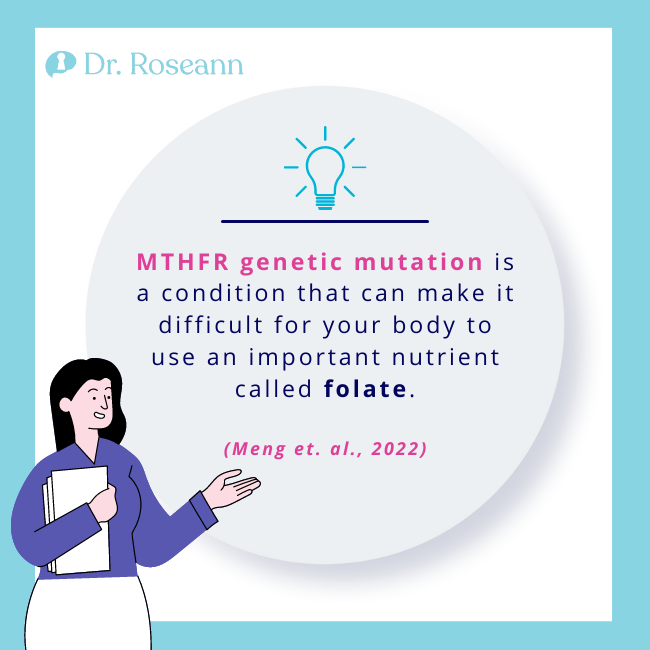When a child has a mental health condition or a special need, it is crucial for parents to understand all the potential factors that may contribute to their child's health and well-being. That means a parent in their own educational journey may have heard about genetic mutations that affect mental health.
MTHFR genetic mutations are relatively common, and some studies suggest that up to 50% of the population may have a variation in the MTHFR gene.
And why is that important? Well, these mutations affect physical and mental health.
For parents of children with conditions such as ADHD, anxiety, OCD, and depression, understanding the potential connection between MTHFR genetic mutations and these disorders can provide valuable insight into the underlying causes of their child's symptoms. Additionally, knowledge of MTHFR genetic mutations can help guide personalized treatment plans that may include dietary modifications and supplements to support proper folate metabolism.
What is MTHFR Genetic Mutation?

MTHFR genetic mutation is a condition that can make it difficult for your body to use an important nutrient called folate (Meng et. al., 2022). Folate helps your body with many important functions, like making new cells and supporting your brain. The MTHFR gene is responsible for making an enzyme that helps turn folate into a form that your body can use. But if there is a change in this gene, the enzyme may not work as well, causing an MTHFR genetic mutation.
MTHFR stands for methylenetetrahydrofolate reductase, which is an enzyme that plays an essential role in converting folate into its active form. Folate is an essential nutrient that plays a critical role in various biological processes, including DNA synthesis and repair, neurotransmitter production, and immune system function.
MTHFR genetic mutations refer to genetic variations in the MTHFR gene that can affect how well the enzyme functions. These variations can lead to reduced or altered enzyme activity, which can affect the body's ability to process and utilize folate. There are two common types of MTHFR genetic mutations, known as C677T and A1298C.
The C677T mutation results in a thermolabile (heat-sensitive) enzyme that has reduced activity, while the A1298C mutation results in a less severe reduction in enzyme activity. Individuals can have one or both mutations, with varying degrees of enzyme activity reduction depending on the specific genetic variant present.
MTHFR genetic mutations are relatively common in the population, with an estimated 30-50% of individuals carrying at least one copy of the mutation. However, the frequency of MTHFR genetic mutations can vary depending on ethnicity and geographical location. For example, the C677T mutation is more common in individuals of European descent, while the A1298C mutation is more prevalent in individuals of Asian descent.
While MTHFR genetic mutations are relatively common, not all individuals with the mutations experience health issues. However, studies have linked MTHFR genetic mutations to various clinical conditions, including ADHD, OCD, anxiety, and depression. Elevated homocysteine levels, which can result from reduced folate metabolism due to MTHFR genetic mutations, have been implicated in these conditions.
Why Should Every Parent Understand What MTHFR Genetic Mutation is?
As a parent, it is important to be aware of your child's MTHFR genetic status, especially if your child has been diagnosed with a clinical condition. Genetic testing can help identify MTHFR genetic mutations and guide personalized treatment plans. Proper management of MTHFR genetic mutations can help improve symptoms and prevent long-term health complications.
There are various ways to manage MTHFR genetic mutations, including dietary changes and supplements. Foods rich in folate, such as leafy greens, legumes, and fortified grains, can help increase folate levels in the body.
Additionally, supplements such as methyl folate, a bioactive form of folate, can be beneficial for individuals with MTHFR genetic mutations. However, it is important to consult with a healthcare professional before starting any supplement regimen.
How Does MTHFR Genetic Mutation Affect Mental Health?
The MTHFR genetic mutation is important in clinical conditions because it has been linked to various health issues, including ADHD, OCD, anxiety, and depression (Wan et. al., 2018).
Studies have shown that individuals with MTHFR genetic mutations are more likely to have these conditions than those without the mutations. Additionally, MTHFR genetic mutations have been linked to other health conditions such as cardiovascular disease, neural tube defects, and certain types of cancer.
MTHFR and Attention Deficit Hyperactivity Disorder or ADHD Symptoms
Attention-deficit/hyperactivity disorder (ADHD) is a neurodevelopmental disorder that affects both children and adults. It is characterized by symptoms such as hyperactivity, impulsivity, and inattention, which can impact daily functioning and quality of life.
Studies have suggested a possible connection between MTHFR genetic mutations and an increased risk for ADHD. The MTHFR gene plays a critical role in folate metabolism, which is essential for the production of neurotransmitters such as serotonin, dopamine, and norepinephrine. These neurotransmitters play important roles in regulating mood, attention, and behavior, and disruptions in their function have been implicated in the development of ADHD.
One study found that individuals with the MTHFR C677T mutation were more likely to have ADHD symptoms than those without the mutation. Another study published in the Journal of Attention Disorders found that children with ADHD were more likely to have MTHFR genetic mutations than those without ADHD.
The mechanisms behind this association are not yet fully understood, but research suggests that MTHFR genetic mutations may lead to reduced folate metabolism, which in turn can impact neurotransmitter production and function. Reduced levels of neurotransmitters such as dopamine and norepinephrine have been implicated in ADHD, suggesting a possible link between MTHFR genetic mutations and the disorder.
Using natural treatments such as PEMF can support the natural detoxification process for those with ADHD.
MTHFR and Anxiety
Anxiety is a common mental health condition that affects individuals of all ages. It is characterized by excessive worry, fear, and nervousness, which can significantly impact daily functioning and quality of life. Studies have suggested a possible link between MTHFR genetic mutations and an increased risk for anxiety.
MTHFR plays a crucial role in the production of neurotransmitters such as serotonin and dopamine, which are important for regulating mood, anxiety, and stress. Research suggests that MTHFR genetic mutations may lead to reduced folate metabolism, which in turn can impact the production and function of these neurotransmitters. This disruption in neurotransmitter function may contribute to the development of anxiety.
One study found that individuals with the MTHFR C677T mutation were more likely to experience anxiety symptoms than those without the mutation. Another study published in the Journal of Affective Disorders found that individuals with MTHFR genetic mutations were more likely to experience panic attacks and generalized anxiety disorder.
MTHFR and OCD
Obsessive-compulsive disorder (OCD) is a mental health condition characterized by intrusive thoughts and repetitive behaviors. These behaviors can significantly impact daily functioning and quality of life. Studies have suggested a possible connection between MTHFR genetic mutations and an increased risk for OCD.
MTHFR plays a critical role in the production of neurotransmitters such as serotonin and dopamine, which are important for regulating mood and behavior. Research suggests that MTHFR genetic mutations may lead to reduced folate metabolism, which in turn can impact the production and function of these neurotransmitters. This disruption in neurotransmitter function may contribute to the development of OCD.
One study published in the Journal of Affective Disorders found that individuals with MTHFR genetic mutations were more likely to experience OCD symptoms than those without the mutation. Another study published in the Journal of Psychiatric Research found that individuals with the MTHFR C677T mutation were more likely to experience compulsive behaviors.
With the right support and resources, individuals with MTHFR genetic mutations and OCD can effectively manage their symptoms and improve their overall quality of life.
MTHFR and Depression
Depression is a common mental health condition that affects individuals of all ages. It is characterized by persistent feelings of sadness, hopelessness, and loss of interest in activities that were once enjoyable. Studies have suggested a possible link between MTHFR genetic mutations and an increased risk for depression.
MTHFR plays a crucial role in the production of neurotransmitters such as serotonin and dopamine, which are important for regulating mood and emotion. Research suggests that MTHFR genetic mutations may lead to reduced folate metabolism, which in turn can impact the production and function of these neurotransmitters. This disruption in neurotransmitter function may contribute to the development of depression.
One study published in the American Journal of Medical Genetics found that individuals with the MTHFR C677T mutation were more likely to experience depressive symptoms than those without the mutation. Another study published in the Journal of Affective Disorders found that individuals with MTHFR genetic mutations were more likely to experience depression and suicidal thoughts.
What Should I Do If I Suspect an MTHFR Genetic Mutation in My Child?
It is important to understand the impact of MTHFR genetic mutations on individuals with certain conditions. A simple test can be done to identify MTHFR genetic mutations and help create a treatment plan tailored to the individual's needs.
For example, individuals with MTHFR genetic mutations may need to eat more foods that contain folic acid, such as spinach, beans, and bread with added vitamins, particularly Vitamin B9. Additionally, taking a supplement called methyl folate, which is a form of folate that is easier for the body to use, may also be helpful. But it is important to talk to a healthcare provider before starting any new supplements.
Apart from supplements and changes in diet, other treatments like cognitive-behavioral therapy, PEMF, and Neurofeedback may also help individuals with conditions like ADHD, anxiety, OCD, and depression. Developing a comprehensive treatment plan as we do on our BrainBehaviorReset™ Program that takes into account the individual's MTHFR genetic status can improve symptoms and prevent long-term health problems.
There may be a link between MTHFR genetic mutations and conditions like ADHD, anxiety, OCD, and depression. Understanding these connections can help create a personalized treatment plan that includes supplements, dietary changes, and other interventions. If you or your child might have an MTHFR genetic mutation and are experiencing symptoms of these conditions, consult a healthcare professional for proper diagnosis and treatment.
Citations:
Caliskan, M., Orenay-Boyacioglu, S., & Dondu, A. (2019). Roles of 5,10-methylenetetrahydrofolate reductase C677T and A1298C polymorphisms in early- and late-onset obsessive-compulsive disorder. Indian journal of psychiatry, 61(2), 161–166. https://doi.org/10.4103/psychiatry.IndianJPsychiatry_370_18
Meng, X., Zheng, J. L., Sun, M. L., Lai, H. Y., Wang, B. J., Yao, J., & Wang, H. (2022). Association between MTHFR (677C>T and 1298A>C) polymorphisms and psychiatric disorder: A meta-analysis. PloS one, 17(7), e0271170. https://doi.org/10.1371/journal.pone.0271170
Moll, S., & Varga, E. A. (2015). Homocysteine and MTHFR Mutations. Circulation, 132(1), e6–e9. https://doi.org/10.1161/CIRCULATIONAHA.114.013311
Wan, L., Li, Y., Zhang, Z., Sun, Z., He, Y., & Li, R. (2018). Methylenetetrahydrofolate reductase and psychiatric diseases. Translational psychiatry, 8(1), 242. https://doi.org/10.1038/s41398-018-0276-6
Always remember… “Calm Brain, Happy Family™”
Disclaimer: This article is not intended to give health advice and it is recommended to consult with a physician before beginning any new wellness regime. *The effectiveness of diagnosis and treatment vary by patient and condition. Dr. Roseann Capanna-Hodge, LLC does not guarantee certain results.
Are you looking for SOLUTIONS for your struggling child or teen?
Dr. Roseann and her team are all about solutions, so you are in the right place!
There are 3 ways to work with Dr. Roseann:
- In-person at her Ridgefield, CT center
- Virtually with her at home neurofeedback and coaching programs
- By joining my Natural Parenting Solutions for ADHD, EF, LD, Anxiety, OCD, Mood & PANS/PANDAS Community
You can get her books for parents and professionals, including: It’s Gonna Be OK™: Proven Ways to Improve Your Child’s Mental Health, Teletherapy Toolkit™ and Brain Under Attack: A Resource For Parents and Caregivers of Children With PANS, PANDAS, and Autoimmune Encephalopathy.
If you are a business or organization that needs proactive guidance to support employee mental health or an organization looking for a brand representative, check out Dr. Roseann’s professional speaking page to see how we can work together.
Dr. Roseann is a Children’s Mental Health Expert and Licensed Therapist who has been featured in/on hundreds of media outlets including The Mel Robbins Show, CBS, NBC, PIX11 NYC, Today, FORBES, CNN, The New York Times, The Washington Post, Business Insider, Women’s Day, Healthline, CNET, Parade Magazine and PARENTS. FORBES called her, “A thought leader in children’s mental health.”

She coined the terms, “Re-entry panic syndrome” and “eco-anxiety” and is a frequent contributor to media on mental health.
Dr. Roseann Capanna-Hodge has three decades of experience in working with children, teens and their families with attention-deficit hyperactivity disorder (ADHD), autism, concussion, dyslexia and learning disability, anxiety, Obsessive Compulsive Disorder (OCD), depression and mood disorder, Lyme Disease, and PANS/PANDAS using science-backed natural mental health solutions such as supplements, magnesium, nutrition, QEEG Brain maps, neurofeedback, PEMF, psychotherapy and other non-medication approaches.
She is the author of three bestselling books, It’s Gonna Be OK!: Proven Ways to Improve Your Child's Mental Health, The Teletherapy Toolkit, and Brain Under Attack. Dr. Roseann is known for offering a message of hope through science-endorsed methods that promote a calm brain.
Her trademarked BrainBehaviorResetⓇ Program and It’s Gonna be OK!Ⓡ Podcast has been a cornerstone for thousands of parents facing mental health, behavioral or neurodevelopmental challenges.
She is the founder and director of The Global Institute of Children’s Mental Health, Neurotastic™Brain Formulas and Dr. Roseann Capanna-Hodge, LLC. Dr. Roseann is a Board Certified Neurofeedback (BCN) Practitioner, a Board Member of the Northeast Region Biofeedback Society (NRBS), Certified Integrative Mental Health Professional (CIMHP) and an Amen Clinic Certified Brain Health Coach. She is also a member of The International Lyme Disease and Associated Disease Society (ILADS), The American Psychological Association (APA), Anxiety and Depression Association of America (ADAA) National Association of School Psychologists (NASP), International OCD Foundation (IOCDF).
© Roseann-Capanna-Hodge, LLC 2023











